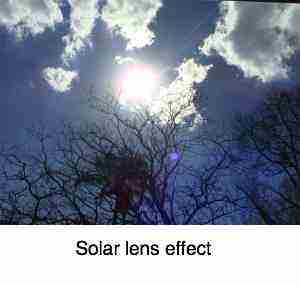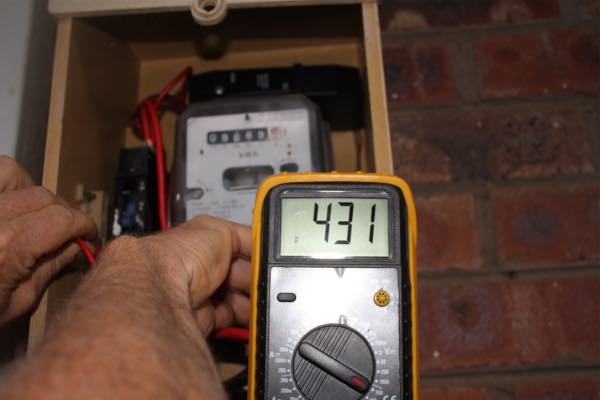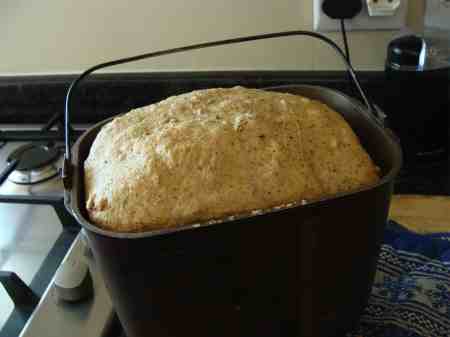- Bernard Preston homepage
- Solar
- Refrigeration Using Solar Power
Refrigeration using solar power
Refrigeration using solar power is a breeze for even a small inverter.
Modern fridges and freezers use relatively little power; somewhere around 300W depending on the size obviously. The total energy consumption is likely to be less than 2 kilowatt-hours per day.

This page was last updated by Bernard Preston on 9th January, 2025.
Since most of this power is required during the day when it's hot, there is a perfect synergy with solar-power.
My first inverter was rated at 2kW and being a novice I was astonished that it would power a fridge and separate freezer when the grid in our area collapsed for 36-hours; they were full of goodies just before Christmas.
Even if you plan to go off the grid which I do not recommend incidentally, adequate lithium batteries will handle the cooling at night with relative ease except perhaps in a very hot climate.
Using prepaid electricity is a better option.
Often the decision to toss an old-fridge or freezer will not be because it no longer functions; but since the seals started to deteriorate it has begun to run all day consuming large amounts of electricity. The compressors usually last for years before they fail.
Instead of tossing that old fridge, put it rather in the garage and run it only on solar power during the day. Keep items in it that need to be cool but it matters not if they warm a little during the night; cold-drinks and beers, for example.
Going off the grid
We have had second thoughts about our aversion to going off the grid since a power-surge from the utility caused immense damage down our street. The figure shown on the multimeter below is double the normal voltage; 220V in South Africa.

Refrigeration using solar power
Refrigeration using solar power is very efficient as cooling is needed mostly during the day.
This is particularly true for green-freaks who have a lot of stored organic foodstuffs. For example, we purchase five 50kg bags of wheat berries every year from a farmer for baking our own wholemeal bread. They need to be frozen for two weeks to kill the weevils.
You'll never find them in white flour by the way; the weevils know the difference between junk food and the real McCoy. Wheat-berries have many of the goodies that we need for vitamins, minerals and phytosterols such as lignans. They are typically extracted during the refining process and sold to pig farmers. We are left with the empty calories.
Then it's always useful to have a couple of extra ice-trays should friends and family suddenly descend on you unexpectedly.
We also keep our tahini in the fridge; it's easier to purchase half a dozen bottles at a time because you have to find a Greek or Lebanese shop. It is good stuff by the way and much nicer than peanut-butter to my mind. We use it for making our quick hummus that turns even the dullest salad into a delight.
Then because I'm the bar-wench at the gliding club, all the surplus drinks are kept in that outside refrigerator in readiness for next Saturday.
In short refrigeration using solar power is a breeze for your inverter if you have enough PV panels; and air-conditioning too. It reduces the payback time of your setup and we find it very useful having a second old freezer that costs nothing to run during the day.
"Shoprite is currently in 2023 spending an extra R100m per month on diesel to keep the lights on and the food chilled in its stores."
On the subject of inverters and PV panels, don't make the mistake I made by putting in a Mickey-Mouse system. It does little for the environment if you produce only 2kWh of sunshine energy per day; and it will stress you out.
My strong advice is to go straight to at least a 60-amp regulator and 5kW inverter; using a 48V system. You will be upgrading to this eventually so do it right from the beginning; then it hurts only once.
You can add more PV panels later; and extra-batteries should you want them but to upgrade the inverter and regulator after a year is a serious waste of time and money. Do it right from the start.
A 48V regulator is so much more efficient. Higher-voltage means lower amperage with fewer lost watts in the cabling; you can use thinner wires too, saving you on the setup costs.
If you are serious about going solar and you have the money, then go straight to a 10kW inverter; that's what I now have and we can run the dishwasher, the oven and charge the E-car without a problem during the day.
It's such a pleasure using only $5 of power per month from the utility; payback time is five to ten years. The best is pure sinewave energy with no dips and surges to burn your electronics.
The best regulator incidentally is called a solar charge controller MPPT; it extracts about a third more from the panels. It costs around an extra eighty bucks; in the long term it's definitely worth it.
But stay on the grid for the inclement weather; for the present at any rate. Utility companies are starting to make draconian demands of those using their own solar power.
Newsletter
Our newsletter is entitled "create a cyan zone" at your home, preserving both yourself and Mother Earth for future generations; and the family too, of course. We promise not to spam you with daily emails promoting various products. You may get an occasional nudge to buy one of my books.
Here are the back issues.
- Lifestyle and ideal body weight
- What are ultra-processed foods?
- Investing in long-term health
- Diseases from plastic exposure
- Intensive lifestyle management for obesity has limited value
- A world largely devoid of Parkinson's Disease
- The impact of friendly bacteria in the tum on the prevention of cancer
- There's a hole in the bucket
- Everyone is talking about weight loss drugs
- Pull the sweet tooth
- If you suffer from heartburn plant a susu
- Refined maize meal and stunting
- Should agriculture and industry get priority for water and electricity?
- Nature is calling
- Mill your own flour
- Bake your own sourdough bread
- Microplastics from our water
- Alternative types of water storage
- Wear your clothes out
- Comfort foods
- Create a bee-friendly environment
- Go to bed slightly hungry
- Keep bees
- Blue zone folk are religious
- Reduce plastic waste
- Family is important
- What can go in compost?
- Grow broad beans for longevity
- Harvest and store sunshine
- Blue zone exercise
- Harvest and store your rainwater
- Create a cyan zone at your home
Inverter technology
When purchasing units requiring refrigeration with solar power, it's worth spending the extra and getting one that uses inverter-technology.
There are three reasons that I can think of.
- Inverter fridges and air-conditioning units use about 30% less electricity.
- Normal electric-motors require a heavy current to start up; that means you need a much larger inverter.
- They are much quieter.
Fridges using inverter technology have variable-speed motors; that means if there is a small rise in temperature, the compressor doesn't need to work at peak capacity, saving electricity.
The compressor never switches off but runs at a very low-speed, making far less noise.
Freezing chickpeas
Freezing chickpeas is the solution if you enjoy hummus; there are several distinct advantages over using the canned variety. Soak them overnight, pressure-cook your dried legumes and store the excess with refrigeration using solar power.
It makes sense to pressure-cook a large amount of dried chickpeas, say a couple of pounds; then drain, cool and freeze them in small packets.
I like to use recycled food grade plastic packets incidentally; our world will soon be suffocated by non-biodegradable synthetics.
Then freezing chickpeas is a breeze; even more so if you have refrigeration using solar power.
They're known as garbanzo-beans, by the way in some parts of the world.
I am sure you have noticed the commitment to permaculture here. Using a pressure-cooker saves time, energy and money. By freezing chickpeas it reduces our dependence on cans. Recycling plastic packets is protecting the environment; Mr Golden Sun provides the power to boil and chill the garbanzo beans. Hummus is one of the world's most nutritious foods.
Wean off plastic if you want your grandchildren to have a habitable world. Capturing solar power energy is another very significant step in protecting our environment; if Bernard Preston has done it, so could you.
Then you can run all your appliances like refrigeration using solar-power.
Using frozen chickpeas it takes me only five minutes to throw together our authentic hummus recipe; you will need to find a source of tahini. It will turn even the most boring salad into a delight for the tongue; and happiness for the colon.
Absolutely do not add any sweetening to your hummus; not even raw honey. It's frightening that excessive sugar drives dementia and stroke; a report from the German Society of Neurology.
If you want to avoid colorectal tumours make sure you are enjoying organic green food every single day; it's all about the fiber.
Probiotic supplements are in; it's just a fad to fleece us of our hard earned cash. It is so easy to make kefir, sauerkraut and kimchi in our own kitchens. But it is hopeless trying to re-establish the intestinal microbes if we are not eating enough fiber.
Low GI bread

Low GI bread too can be cooked using a small oven powered by solar. I alluded above to the fact that we store wheat berries for a whole year by refrigeration using solar power; freezing the grain for two weeks kills the weevils.
Including grinding the wheat to make healthy flour, it takes only five minutes to prepare the goodies for low GI bread. No chemicals, half the salt and a wonderful mixture of ground seeds give this loaf a divine flavour.
Bake and cook during the day when the sun's energy is pouring in; and refrigeration using solar power has so many applications in the home.
Global warming
The greenhouse gases are turning our whole planet into one giant pressure-cooker. Heat waves are killing us. The last time Kyiv for example reached the summer temperatures of 2024 was in 1931; nearly a century ago.
Tahini
Tahini is a wonderful paste made from sesame. Like all nuts and seeds, once the shell is cracked it starts to go rancid very quickly; our solution is refrigeration using solar power.
Nuts should be eaten freshly-cracked, or vacuum packed and seeds kept cold; refrigeration using solar power is perfect for keeping goodies like these cool.
This tahini paste can be found in Greek and Lebanese shops; we enjoy it too on our low GI bread to mop up salad juices. The taste is heavenly.
Tahini and the benefits of freezing chickpeas is one of the many discoveries Bernard Preston made whilst living in the Netherlands for seven years. Have you read Stones in my Clog?
Holland is also where he got the inspiration for using solar power. Refrigeration is just one of the many blessings brought by Mr Golden Sun, as his grandchildren call him.
Useful links
- Day in the life of solar geek Bernard Preston.
- Total blackout.
- Off the grid.
- Solar powered generator upgrade; avoid it by doing it right the first time.
- Solar Powered Air Conditioning Unit
When browsing use right click and Open Link in New Tab, or you may get a bad gateway signal.
Bernard Preston
Bernard Preston is a physics major who continued his studies after teaching high school science for nearly a decade to become a DC. After forty years in practice he is now semi-retired; pottering in his organic garden, playing with his solar generator and flying gliders over the weekend; refrigeration using the sun's energy is just one small benefit of going green.
Live life at full-speed is his motto, foot flat on the accelerator and hope to drop dead in harness with all your marbles intact. No old age home and dementia for him.
Refrigeration using solar power is just one of his little interests. An air-conditioner energised during the day by the sun is his next chore.
He's something of a green freak with organically-grown fresh vegetables, huge compost heaps and worm farms; with free ranging hens that are all part of their green home.
Then he's a writer of some note; you might enjoy one of his books from the coalface, like "Bats in my Belfry." He is busy with his seventh; called Priests Denied, it is going to be controversial.
See the navigation bar above; they are dirt cheap on Kindle.
Did you find this page interesting? How about forwarding it to a friendly book or food junkie? Better still, a social media tick would help.
- Bernard Preston homepage
- Solar
- Refrigeration Using Solar Power
Address:
56 Groenekloof Rd,
Hilton, KZN
South Africa
Website:
https://www.bernard-preston.com